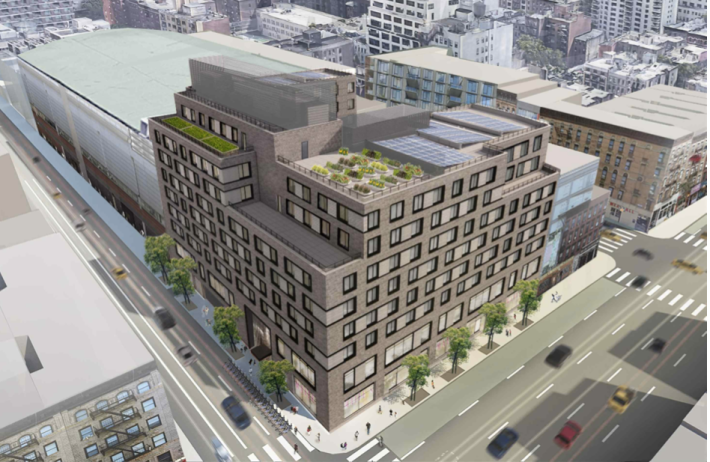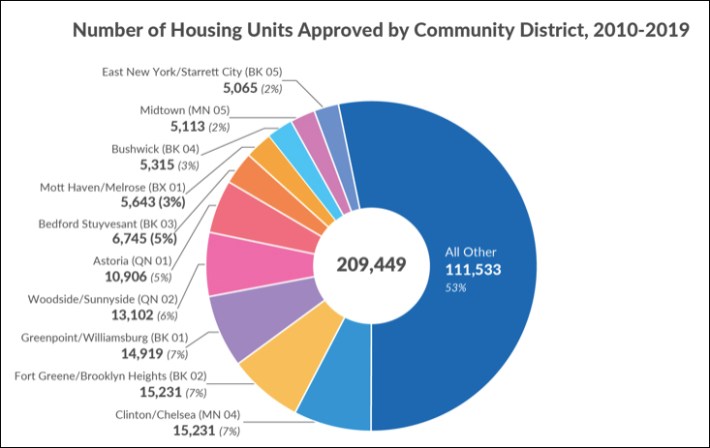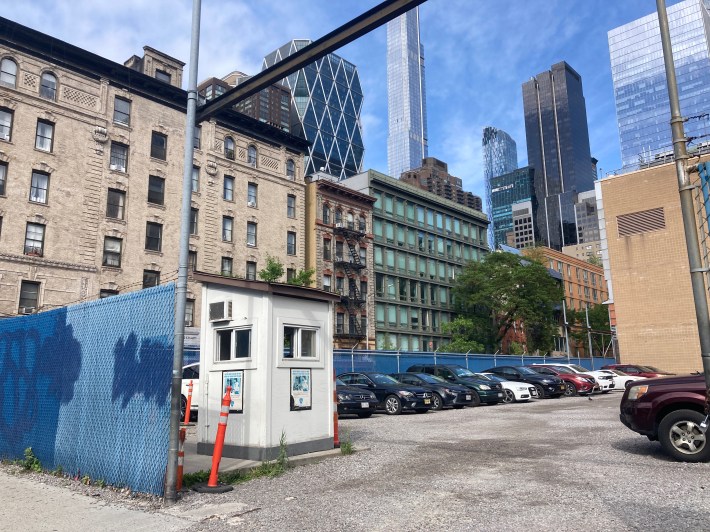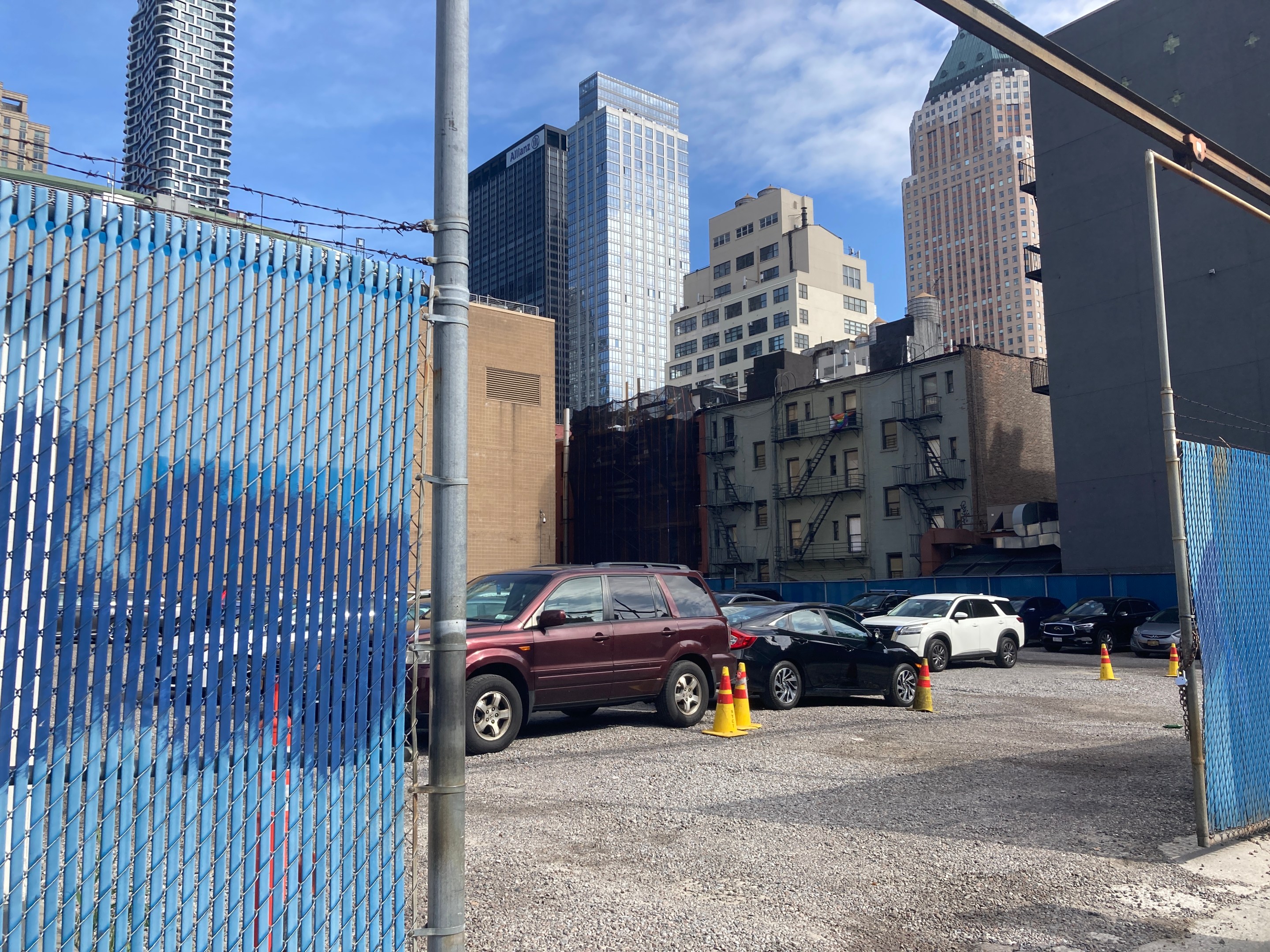It's an epidemic failure.
Residents of Hells Kitchen are pushing back against an affordable housing project that would cater to survivors of HIV/AIDS because they say the units are too affordable — and want to maintain the charm of the block. In this case, a parking lot.
Members of Manhattan's usually progressive Community Board 4 voted down the project in March, arguing that the site of The Lirio, at the corner of 54th Street and Ninth Avenue, should be reserved only for middle-income families.
“We don’t want a neighborhood that is all poor and all rich,” said Richard Marans, a founder and member of the West 47/48th Street Block Association, during a March 2 meeting on the Lirio proposal.
The 112-unit building, which would rise on the site of a current MTA parking lot, would include 67 units for the formerly homeless, of which 59 would be supportive housing units for survivors of HIV/AIDS, and 44 units of affordable housing for families, set at 40-80 percent of the Area Median Income.
HIV/AIDS advocates and survivors support the project, touting the humanitarian need for residents, and the larger benefit to those in the community who have long suffered.
"The siting of this project could not be more appropriate in the neighborhood, where many of the seniors living with HIV could actually age in place within a community that has so many existing men and women living with HIV,” said Christopher Tepper, the co-founder of the New York City AIDS Memorial, during the March community board meeting. "I understand there are concerns in the community about [the need for] more middle income housing [but] the appropriate response to that from the community board is not to fight this much-needed and appropriate and dignified supportive housing for seniors living with HIV; it's to put in your resolution that you want more housing for middle-income families."
The Lirio would also include retail, and about 30,000 square feet of office space to house an annex of the MTA’s Rail Control Center.
But some residents claim it would ruin the "character" of the neighborhood — a frequent rallying call to oppose new development.
"It's a very sad situation ... because the neighborhood character is going to be changed so much by only having social services here,” said Jone Noveck, who identified herself as a 36-year homeowner on 47th Street, during the same meeting.

And a group calling itself Neighbors for Hells Kitchen even made a bizarre propaganda video, which now seems to be scrubbed from the internet, railing against the project.
“The people of Hells Kitchen have been waiting 15 years for the middle-class affordable housing we were promised at Ninth Avenue and 54th Street,” a blurb on the group’s now-defunct website says. "Now we're being told we'll never get it. Rents are rising and we have nowhere to go."
But supporters of The Lirio say it’s not a zero-sum game, especially when the alternative is storage space for cars. Residents can support this project, and still advocate for more middle-income housing.
“We’re seeing opposition to a deeply affordable housing project that will replace a parking lot. Something is clearly broken,” said Will Thomas, the executive director of the pro-housing organization Open New York. “It just goes to show people can get unhappy with any kind of change, which is regrettable when the current site is a parking lot. I think the project is clearly an improvement over the status quo.”
The status quo being a housing crisis that is partly responsible for rents skyrocketing more than 38 percent from the year before, according to the real estate firm Douglas Elliman and reported by the Times. And ... a parking lot.
But Community Board 4 has distinguished itself from other neighborhoods in that it has supported the construction of a significant number of new housing units, according to the Citizens Budget Committee, as the chart below shows.

Before breaking ground on the Lirio, its developers — the real estate firm Hudson Companies Inc., and Housing Works, a non-profit organization fighting AIDS and homelessness — must first win a rezoning through the Uniform Land Use Review Procedure, which involves the community board, the Manhattan Borough President, and the City Planning Commission, and requires the approval of the local city council member. In this case, Council Member Erik Bottcher (D-Hells Kitchen).

The community board has already weighed in, rejecting the application; Manhattan Borough President Mark Levine recommended approval of the project with few conditions, including adding a grocery store as part of the commercial space and modifying the façade; and the City Planning Commission held its own hearing on the project on April 27. After initial publication of this story, the City Planning Commission voted to approve the application for development.
One bogus argument against the application from critics of the project is that a decade-old rezoning of the neighborhood called The Western Rail Yards Rezoning Points of Agreement specified that only that middle-income housing would be built on this site.
But the opponents are wrong, said a spokesperson for the developer; The Lirio project meets all the requirements of that agreement.
After its rejection, the community board penned a letter to city officials offering several conditions for approval, including modifying the façade to be more contextual with other buildings along Ninth Avenue, and raising the affordability bracket so that the building includes no more than 25 percent of the units at 80 percent of the area median income and the rest between 80 and 165 percent AMI.
At 80 percent of the current area mean income, those few one-bedroom units would rent for $2,002, for example, and at 165 percent of the AMI, the remaining one-bedrooms could be priced at up to $4,129 a month, according to information from the city.
But in Hells Kitchen, the median household income is $90,422, according to the latest census data. Following the old adage of one's annual salary should be at least 40 times the monthly rent, the maximum rent a person making $90,000 should pay is $2,250 — roughly half of the 165 percent AMI bracket that some members of Community Board 4 want.
“I object to the application in its current form, unless a change to the unit structure income band is achieved,” Jeffrey LeFrancois, the chairman of CB4, said at the April 27 Planning hearing. "Should work done a decade ago be cast aside simply because a little time has passed? We do not think so. This is by no means a ‘not in my backyard’ position. … This is to build what was promised.”
But focusing on the affordability of the project is just a smoke screen to prevent any change at all, according to supporters of the project.
“The focus on middle-income housing is misguided. There’s plenty of space for more mixed-income in future rebuilding," said Thomas. "Lots of scaremongering anti-homeless sentiment, regrettable to see at the community board meeting. Really illustrates that opposition to projects is about keeping things the way they are.”
This story has been updated to include a vote of approval from the City Planning Commission






